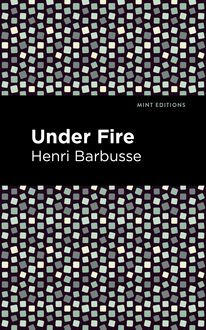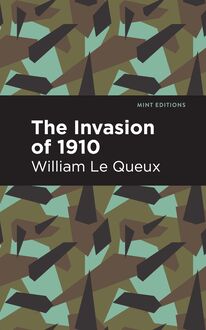-
 Univers
Univers
-
 Ebooks
Ebooks
-
 Livres audio
Livres audio
-
 Presse
Presse
-
 Podcasts
Podcasts
-
 BD
BD
-
 Documents
Documents
-
- Cours
- Révisions
- Ressources pédagogiques
- Sciences de l’éducation
- Manuels scolaires
- Langues
- Travaux de classe
- Annales de BEP
- Etudes supérieures
- Maternelle et primaire
- Fiches de lecture
- Orientation scolaire
- Méthodologie
- Corrigés de devoir
- Annales d’examens et concours
- Annales du bac
- Annales du brevet
- Rapports de stage
La lecture à portée de main
Vous pourrez modifier la taille du texte de cet ouvrage
Découvre YouScribe en t'inscrivant gratuitement
Je m'inscrisDécouvre YouScribe en t'inscrivant gratuitement
Je m'inscrisEn savoir plus
Vous pourrez modifier la taille du texte de cet ouvrage
En savoir plus

Description
Under Fire (1916) is a novel by Henri Barbusse. Written from notes taken while Barbusse was serving in the First World War, the novel was quickly recognized as a powerful tale of perseverance and comradery in the face of unspeakable suffering. Intended to promote the cause of pacifism, Under Fire is deeply critical of the rich and powerful men whose inability to live peacefully leads time and again to the sacrifice of countless human lives. “Each country whose frontiers are consumed by carnage is seen tearing from its heart ever more warriors of full blood and force. One's eyes follow the flow of these living tributaries to the River of Death. To north and south and west afar there are battles on every side. Turn where you will, there is war in every corner of that vastness.” Even from a distance, war is hell on earth, but it is not something that can be described in the abstract, if it can be described at all. Such a luxury—available only to the leaders who declare war’s beginning and end—is not afforded to those are sent to fight. Following a squad of French volunteers on the Western front, Henri Barbusse provides a realistically brutal vision of death and survival that refuses to glorify the loss of a single life. As a soldier-turned-pacifist, Barbusse brings his reader as close as possible to the trenches and fields of battle in order to dispel the myths that continue to justify and obscure the deaths of the poor and powerless. With a beautifully designed cover and professionally typeset manuscript, this edition of Henri Barbusse’s Under Fire is a classic work of French literature reimagined for modern readers.
Sujets
Informations
| Publié par | Mint Editions |
| Date de parution | 28 mai 2021 |
| Nombre de lectures | 3 |
| EAN13 | 9781513288291 |
| Langue | English |
| Poids de l'ouvrage | 1 Mo |
Informations légales : prix de location à la page 0,0500€. Cette information est donnée uniquement à titre indicatif conformément à la législation en vigueur.
Extrait
Under Fire
Henri Barbusse
Under Fire was first published in 1916.
This edition published by Mint Editions 2021.
ISBN 9781513283272 | E-ISBN 9781513288291
Published by Mint Editions ®
minteditionbooks.com
Publishing Director: Jennifer Newens
Design & Production: Rachel Lopez Metzger
Project Manager: Micaela Clark
Translated by: Fitzwater Wray
Typesetting: Westchester Publishing Services
C ONTENTS I. T HE V ISION II. I N THE E ARTH III. T HE R ETURN IV. V OLPATTE AND F OUILLADE V. S ANCTUARY VI. H ABITS VII. E NTRAINING VIII. O N L EAVE IX. T HE A NGER OF V OLPATTE X. A RGOVAL XI. T HE D OG XII. T HE D OORWAY XIII. T HE B IG W ORDS XIV. O F B URDENS XV. T HE E GG XVI. A N I DYLL XVII. I N THE S AP XVIII. A B OX OF M ATCHES XIX. B OMBARDMENT XX. U NDER F IRE XXI. T HE R EFUGE XXII. G OING A BOUT XXIII. T HE F ATIGUE -P ARTY XXIV. T HE D AWN
I
T HE V ISION
M ont Blanc, the Dent du Midi, and the Aiguille Verte look across at the bloodless faces that show above the blankets along the gallery of the sanatorium. This roofed-in gallery of rustic wood-work on the first floor of the palatial hospital is isolated in Space and overlooks the world. The blankets of fine wool—red, green, brown, or white—from which those wasted cheeks and shining eyes protrude are quite still. No sound comes from the long couches except when some one coughs, or that of the pages of a book turned over at long and regular intervals, or the undertone of question and quiet answer between neighbors, or now and again the crescendo disturbance of a daring crow, escaped to the balcony from those flocks that seem threaded across the immense transparency like chaplets of black pearls.
Silence is obligatory. Besides, the rich and high-placed who have come here from all the ends of the earth, smitten by the same evil, have lost the habit of talking. They have withdrawn into themselves, to think of their life and of their death.
A servant appears in the balcony, dressed in white and walking softly. She brings newspapers and hands them about.
“It’s decided,” says the first to unfold his paper. “War is declared.”
Expected as the news is, its effect is almost dazing, for this audience feels that its portent is without measure or limit. These men of culture and intelligence, detached from the affairs of the world and almost from the world itself, whose faculties are deepened by suffering and meditation, as far remote from their fellow men as if they were already of the Future—these men look deeply into the distance, towards the unknowable land of the living and the insane.
“Austria’s act is a crime,” says the Austrian.
“France must win,” says the Englishman.
“I hope Germany will be beaten,” says the German.
They settle down again under the blankets and on the pillows, looking to heaven and the high peaks. But in spite of that vast purity, the silence is filled with the dire disclosure of a moment before.
War!
Some of the invalids break the silence, and say the word again under their breath, reflecting that this is the greatest happening of the age, and perhaps of all ages. Even on the lucid landscape at which they gaze the news casts something like a vague and somber mirage.
The tranquil expanses of the valley, adorned with soft and smooth pastures and hamlets rosy as the rose, with the sable shadow-stains of the majestic mountains and the black lace and white of pines and eternal snow, become alive with the movements of men, whose multitudes swarm in distinct masses. Attacks develop, wave by wave, across the fields and then stand still. Houses are eviscerated like human beings and towns like houses. Villages appear in crumpled whiteness as though fallen from heaven to earth. The very shape of the plain is changed by the frightful heaps of wounded and slain.
Each country whose frontiers are consumed by carnage is seen tearing from its heart ever more warriors of full blood and force. One’s eyes follow the flow of these living tributaries to the River of Death. To north and south and west afar there are battles on every side. Turn where you will, there is war in every corner of that vastness.
One of the pale-faced clairvoyants lifts himself on his elbow, reckons and numbers the fighters present and to come—thirty millions of soldiers. Another stammers, his eyes full of slaughter, “Two armies at death-grips—that is one great army committing suicide.”
“It should not have been,” says the deep and hollow voice of the first in the line. But another says, “It is the French Revolution beginning again.” “Let thrones beware!” says another’s undertone.
The third adds, “Perhaps it is the last war of all.” A silence follows, then some heads are shaken in dissent whose faces have been blanched anew by the stale tragedy of sleepless night—“Stop war? Stop war? Impossible! There is no cure for the world’s disease.”
Some one coughs, and then the Vision is swallowed up in the huge sunlit peace of the lush meadows. In the rich colors of the glowing kine, the black forests, the green fields and the blue distance, dies the reflection of the fire where the old world burns and breaks. Infinite silence engulfs the uproar of hate and pain from the dark swarmings of mankind. They who have spoken retire one by one within themselves, absorbed once more in their own mysterious malady.
But when evening is ready to descend within the valley, a storm breaks over the mass of Mont Blanc. One may not go forth in such peril, for the last waves of the storm-wind roll even to the great veranda, to that harbor where they have taken refuge; and these victims of a great internal wound encompass with their gaze the elemental convulsion.
They watch how the explosions of thunder on the mountain upheave the level clouds like a stormy sea, how each one hurls a shaft of fire and a column of cloud together into the twilight; and they turn their wan and sunken faces to follow the flight of the eagles that wheel in the sky and look from their supreme height down through the wreathing mists, down to earth.
“Put an end to war?” say the watchers.—“Forbid the Storm!”
Cleansed from the passions of party and faction, liberated from prejudice and infatuation and the tyranny of tradition, these watchers on the threshold of another world are vaguely conscious of the simplicity of the present and the yawning possibilities of the future.
The man at the end of the rank cries, “I can see crawling things down there”—“Yes, as though they were alive”—“Some sort of plant, perhaps”—“Some kind of men”—
And there amid the baleful glimmers of the storm, below the dark disorder of the clouds that extend and unfurl over the earth like evil spirits, they seem to see a great livid plain unrolled, which to their seeing is made of mud and water, while figures appear and fast fix themselves to the surface of it, all blinded and borne down with filth, like the dreadful castaways of shipwreck. And it seems to them that these are soldiers.
The streaming plain, seamed and seared with long parallel canals and scooped into water-holes, is an immensity, and these castaways who strive to exhume themselves from it are legion. But the thirty million slaves, hurled upon one another in the mud of war by guilt and error, uplift their human faces and reveal at last a bourgeoning Will. The future is in the hands of these slaves, and it is clearly certain that the alliance to be cemented some day by those whose number and whose misery alike are infinite will transform the old world.
II
I N THE E ARTH
T he great pale sky is alive with thunderclaps. Each detonation reveals together a shaft of red falling fire in what is left of the night, and a column of smoke in what has dawned of the day. Up there—so high and so far that they are heard unseen—a flight of dreadful birds goes circling up with strong and palpitating cries to look down upon the earth.
The earth! It is a vast and water-logged desert that begins to take shape under the long-drawn desolation of daybreak. There are pools and gullies where the bitter breath of earliest morning nips the water and sets it a-shiver; tracks traced by the troops and the convoys of the night in these barren fields, the lines of ruts that glisten in the weak light like steel rails, mud-masses with broken stakes protruding from them, ruined trestles, and bushes of wire in tangled coils. With its slime-beds and puddles, the plain might be an endless gray sheet that floats on the sea and has here and there gone under. Though no rain is falling, all is drenched, oozing, washed out and drowned, and even the wan light seems to flow.
Now you can make out a network of long ditches where the lave of the night still lingers. It is the trench. It is carpeted at bottom with a layer of slime that liberates the foot at each step with a sticky sound; and by each dug-out it smells of the night’s excretions. The holes themselves, as you stoop to peer in, are foul of breath.
I see shadows coming from these sidelong pits and moving about, huge and misshapen lumps, bear-like, that flounder and growl. They are “us.” We are muffled like Eskimos. Fleeces and blankets and sacking wrap us up, weigh us down, magnify us strangely. Some stretch themselves, yawning profoundly. Faces appear, ruddy or leaden, dirt-disfigured, pierced by the little lamps of dull and heavy-lidded eyes, matted with uncut beards and foul with forgotten hair.
Crack! Crack! Boom!—rifle fire and cannonade. Above us and all around, it crackles and rolls, in long gusts or separate explosions. The flaming and melancholy storm never, never ends. For more than fifteen months, for five hundred days in this part of the world where we are, the rifles and the big guns have gone on from morning to night and from night to morning. We are buried deep in an everlasting battlefield; but like the ticking of the clocks at home in the days gone by—in the now almost legendary Past—you only hear the noise when you l
-
 Univers
Univers
-
 Ebooks
Ebooks
-
 Livres audio
Livres audio
-
 Presse
Presse
-
 Podcasts
Podcasts
-
 BD
BD
-
 Documents
Documents
-
Jeunesse
-
Littérature
-
Ressources professionnelles
-
Santé et bien-être
-
Savoirs
-
Education
-
Loisirs et hobbies
-
Art, musique et cinéma
-
Actualité et débat de société
-
Jeunesse
-
Littérature
-
Ressources professionnelles
-
Santé et bien-être
-
Savoirs
-
Education
-
Loisirs et hobbies
-
Art, musique et cinéma
-
Actualité et débat de société
-
Actualités
-
Lifestyle
-
Presse jeunesse
-
Presse professionnelle
-
Pratique
-
Presse sportive
-
Presse internationale
-
Culture & Médias
-
Action et Aventures
-
Science-fiction et Fantasy
-
Société
-
Jeunesse
-
Littérature
-
Ressources professionnelles
-
Santé et bien-être
-
Savoirs
-
Education
-
Loisirs et hobbies
-
Art, musique et cinéma
-
Actualité et débat de société
- Cours
- Révisions
- Ressources pédagogiques
- Sciences de l’éducation
- Manuels scolaires
- Langues
- Travaux de classe
- Annales de BEP
- Etudes supérieures
- Maternelle et primaire
- Fiches de lecture
- Orientation scolaire
- Méthodologie
- Corrigés de devoir
- Annales d’examens et concours
- Annales du bac
- Annales du brevet
- Rapports de stage










